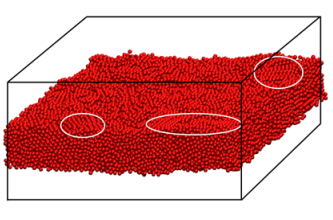Abstract
Despite nearly 20 years of active research, the effects of nanoscale confinement on the properties of glass forming polymers remain poorly understood. In particular, the effects of varying polymer chemistry have received comparatively little attention, as many experimental and simulation studies have focused on model polymer systems. In this paper, we use molecular dynamics simulations to investigate the confinement effects of glass-forming polymers with varying backbone rigidity. We find that our model polymers with more rigid backbones experience reduced confinement effects compared to flexible polymers, which is in good qualitative agreement with recent experiments. Furthermore, we find that for a single material, the magnitude of the confinement effect can vary strongly depending on the property investigated to measure the confinement effects. For example, relaxation times studies using the intermediate scattering function can vary dramatically from the bond autocorrelation function. We attribute this finding to enhanced ordering in the vicinity of the free surface in our model polymers with more rigid backbones. Our results indicate that other physical effects beyond glassy dynamics, such as local ordering, may play a role in nanoscale confinement of polymer glasses.
